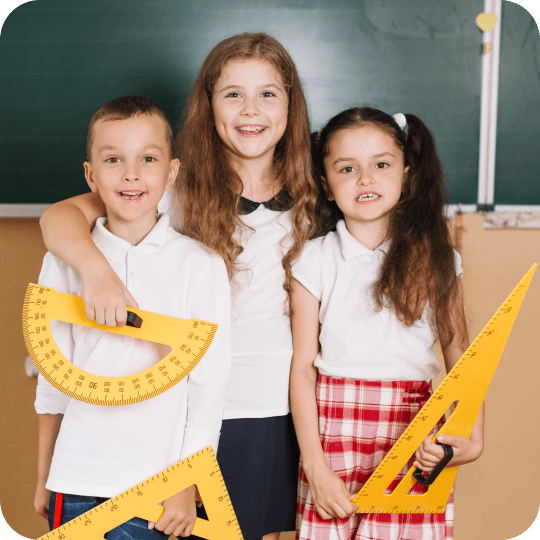Why
Primary Tutoring?
Tutoring can be a game-changer for young learners, offering benefits such as boosting confidence, strengthening core skills, and providing expert guidance in preparation for exams like SATs. At KS1 and KS2, students are expected to develop foundational skills across a range of subjects, with a prime focus on Mathematics and English.
We are dedicated to nurturing this growth. Our experienced tutors use their extensive skills and strong subject knowledge to lay a firm foundation for learners. This way, they can step into secondary school with confidence and a head start on the path to becoming high achievers.

It's not uncommon for challenges encountered at the GCSE level to stem from gaps in understanding of fundamental concepts introduced in primary school.
At Shalom Education, we focus on bridging these early gaps, helping each child unlock their full potential throughout their educational journey.

Classroom tutoring in a small group

Online tutoring in a small group

Individualised one-to-one online tutoring
KS1 (Years 1 and 2)
Year 1 (Ages 5 to 6)
English:
- Spoken Language
- Reading: Word Reading, Comprehension
- Writing: Transcription, Composition, Vocabulary, Grammar and Punctuation
Mathematics:
- Numbers – Number and Place Value
- Numbers – Addition and Subtraction
- Numbers – Multiplication and Division
- Numbers – Fractions
- Measurement
- Geometry – Properties of Shapes
- Geometry – Position and Direction
Year 2 (Ages 6 to 7)
English:
- Reading: Word Reading, Comprehension
- Writing: Transcription, Composition, Vocabulary, Grammar and Punctuation
Mathematics:
- Numbers – Number and place value
- Numbers – Addition and Subtraction
- Numbers – Multiplication and Division
- Numbers – Fractions
- Measurement
- Geometry – Properties of Shapes
- Geometry – Position and Direction
- Statistics
At the end of KS1, the learner is expected to:
- Count, read, and write numbers from 1 to 100
- Spell out numbers from 1 to 20
- Use number lines to understand the concepts of “one more” and “one less”
- Have working knowledge of addition and subtraction
KS2 (Years 3 to 6)
Year 3 (Ages 7 to 8):
English:
- Reading – Word reading
- Reading – Comprehension
- Writing – Transcription
- Writing – Composition
- Writing – Vocabulary, Grammar and Punctuation
Mathematics:
- Numbers – Number and Place Value
- Numbers – Addition and Subtraction
- Numbers – Multiplication and Division
- Numbers – Fractions
- Measurement
- Geometry – Properties of Shapes
- Geometry – Position and Direction
Year 4 (Ages 8 to 9):
English:
- Reading – Word Reading
- Reading – Comprehension
- Writing – Transcription
- Writing – Comprehension
- Writing – Vocabulary, Grammar and Punctuation
Mathematics:
- Numbers – Number and place value
- Numbers – Addition and Subtraction
- Numbers – Multiplication and Division
- Numbers – Fractions
- Measurement
- Geometry – Properties of Shapes
- Geometry – Position and Direction
- Statistics
Year 5 (Ages 9 to 10):
English:
- Reading – Word Reading
- Reading – Comprehension
- Writing – Transcription
- Writing – Comprehension
- Writing – Vocabulary, Grammar and Punctuation
Mathematics:
- Numbers – Number and place value
- Numbers – Addition and Subtraction
- Numbers – Multiplication and Division
- Numbers – Fractions
- Measurement
- Geometry – Properties of Shapes
- Geometry – Position and Direction
- Statistics
Year 5 (Ages 9 to 10):
English:
- Reading – Word Reading
- Reading – Comprehension
- Writing – Transcription
- Writing – Comprehension
- Writing – Vocabulary, Grammar and Punctuation
Mathematics:
- Numbers – Number and place value
- Numbers – Addition and Subtraction
- Numbers – Multiplication and Division
- Numbers – Fractions
- Algebra• Measurement
- Geometry – Properties of Shapes
- Geometry – Position and Direction
- Statistics
At the end of KS1, the learner is expected to:
- Count, read, and write numbers from 1 to 100
- Spell out numbers from 1 to 20
- Use number lines to understand the concepts of “one more” and “one less”
- Have working knowledge of addition and subtraction
We Make Learning More Efficient
We Make Learning more Engaging Improving engagement is a key factor when tutoring at Key Stage 1 and 2. To achieve this, we have integrated many features into our learning platform that make each lesson more unique. From dynamic whiteboard sessions to detailed worksheets and homework annotations, we've designed every aspect to nurture curiosity and active participation.
We believe in celebrating every milestone in the learning journey. Students often want to visualise their progress, so they know their hard work amounts to something. To make this possible, we send monthly and termly reports, documenting each learner's progress and we award prizes to recognise effort.